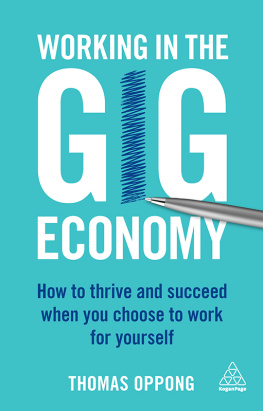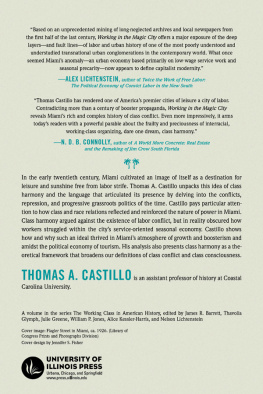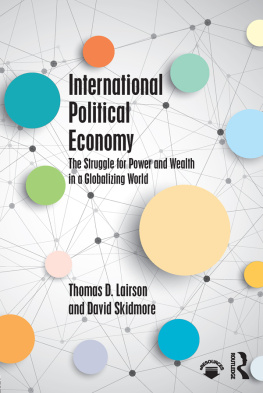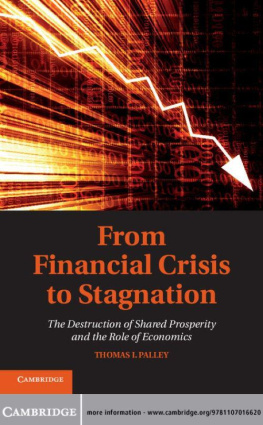Thomas Oppong - Working in the Gig Economy
Here you can read online Thomas Oppong - Working in the Gig Economy full text of the book (entire story) in english for free. Download pdf and epub, get meaning, cover and reviews about this ebook. year: 2018, publisher: Kogan Page, genre: Politics. Description of the work, (preface) as well as reviews are available. Best literature library LitArk.com created for fans of good reading and offers a wide selection of genres:
Romance novel
Science fiction
Adventure
Detective
Science
History
Home and family
Prose
Art
Politics
Computer
Non-fiction
Religion
Business
Children
Humor
Choose a favorite category and find really read worthwhile books. Enjoy immersion in the world of imagination, feel the emotions of the characters or learn something new for yourself, make an fascinating discovery.
- Book:Working in the Gig Economy
- Author:
- Publisher:Kogan Page
- Genre:
- Year:2018
- Rating:3 / 5
- Favourites:Add to favourites
- Your mark:
- 60
- 1
- 2
- 3
- 4
- 5
Working in the Gig Economy: summary, description and annotation
We offer to read an annotation, description, summary or preface (depends on what the author of the book "Working in the Gig Economy" wrote himself). If you haven't found the necessary information about the book — write in the comments, we will try to find it.
Working in the Gig Economy — read online for free the complete book (whole text) full work
Below is the text of the book, divided by pages. System saving the place of the last page read, allows you to conveniently read the book "Working in the Gig Economy" online for free, without having to search again every time where you left off. Put a bookmark, and you can go to the page where you finished reading at any time.
Font size:
Interval:
Bookmark:

Working in the Gig Economy
How to thrive and succeed when you choose to work for yourself
Thomas Oppong

Publishers note
Every possible effort has been made to ensure that the information contained in this book is accurate at the time of going to press, and the publisher and author cannot accept responsibility for any errors or omissions, however caused. No responsibility for loss or damage occasioned to any person acting, or refraining from action, as a result of the material in this publication can be accepted by the editor, the publisher or any of the authors.
First published in Great Britain and the United States in 2019 by Kogan Page Limited
Apart from any fair dealing for the purposes of research or private study, or criticism or review, as permitted under the Copyright, Designs and Patents Act 1988, this publication may only be reproduced, stored or transmitted, in any form or by any means, with the prior permission in writing of the publishers, or in the case of reprographic reproduction in accordance with the terms and licences issued by the CLA. Enquiries concerning reproduction outside these terms should be sent to the publishers at the undermentioned addresses:
2nd Floor, 45 Gee Street
London EC1V 3RS
United Kingdom
www.koganpage.com
c/o Martin P Hill Consulting
122 W 27th St, 10th Floor
New York NY 10001
USA
4737/23 Ansari Road
Daryaganj
New Delhi 110002
India
Thomas Oppong 2019
The right of Thomas Oppong to be identified as the author of this work has been asserted by him in accordance with the Copyright, Designs and Patents Act 1988.
ISBN 978 0 7494 8355 5
E-ISBN 978 0 7494 8356 2
Typeset by Integra Software Services, Pondicherry
Print production managed by Jellyfish
Printed and bound by CPI Group (UK) Ltd, Croydon, CR0 4YY
On 13 June 2018 the British Supreme Court ruled that Gary Smith, employed by Pimlico Plumbers as a self-employed plumber, was entitled to workers rights such as sick pay and holiday, following a dispute over his employment status.
Even though there is no guarantee that similar cases will be decided in the same way, the decision has set a strong precedent for anyone working in the gig economy. The ruling is likely to be used by regulators to amend the employment law to protect the self-employed and offer them more protection. Thousands of gig workers are set to benefit in different ways in the future, especially those who work for single employers.
This is one of the biggest decisions ever made by the courts on workers rights. Thousands of workers like Gary Smith could now find themselves with the added security of benefits like sick pay and holiday pay, says Rebecca Hilsenrath, Equality and Human Rights Commission Chief Executive.
The Supreme Court ruling is a step closer to clarifying the issue of the employment status of gig workers.
The future is here. The workforce of the future is mobile, adaptable and flexible. Actors, musicians and seasonal farm workers have always migrated from gig to gig for many years, but in recent years the trend has undergone a continuous change and expanded into different industries. Short-term on-demand talent is in high demand.
The gig economy is a fast-growing pool of short-term independent contractors and freelancers. It is becoming a viable alternative to traditional nine-to-five work. A growing body of research points to the continuous growth of flexible workers. McKinsey has predicted that by 2025 over 60 million people around the world could benefit from the growth of talent platforms that help people find freelance work that suits their skills. As the gig economy grows, it will open new opportunities for highly skilled and dynamic individuals who expect more than a stable and secure job.
Millions of people and thousands of companies have already benefited from the new, modern world of work. The gig economy empowers people, both skilled and unskilled, to manage their time, work and how much they earn without committing to traditional long-term contracts. The growth of the gig economy has been largely influenced by technology, and the changing work culture across the world. As the pace of technology increases, millions of people are finding new ways to boost their income. The new reality is that you can leverage technology to get paid for your work. People who have mastered their craft dont need permission to profit from their skills. They no longer have to wait to be chosen. With the right tools, you can work from anywhere, on any device, and collaborate with people youve never met. Technology is empowering people to earn money on their own terms, but the growth of the gig economy is not limited to digital technologies. Contractors, freelancers and part-time workers from all industries are choosing to work for themselves. Work processes are changing to support the agile, flexible and mobile workforce.
The transformative growth of the gig economy is leading to an increased specialization of skill. Building a career as an expert is increasingly becoming the ultimate form of career insurance. Today, its easier to earn income from multiple sources as an expert. There is no cap on what you can earn, other than your available productive time. The promise of freedom, flexibility, control and a bigger, better and more creative career makes independent work an attractive option for millions of people across the world.
This book aims to provide practical ideas to help you leverage the gig economy, validate your ideas for independent work, launch a purposeful career and build a successful personal brand, and succeed as a gig worker when you embrace the gig economy. Its a guide for embracing the freelance lifestyle, with practical examples and rich experiences of people who have succeeded in the gig economy. It will prepare you to face the future with confidence.
My favourite part of writing this book has been interviewing interesting people who tell their stories about why theyve embrace independent work, and how its benefited both their profits and happiness. Working in the Gig Economy is your guide to building the life you want and thriving in the gig economy. The gig economy is poised for growth, and Working in the Gig Economy will prepare you to build a career that can stand the test of time and enable you to live your life on your own terms.
This chapter will provide an overview of the gig economy. We will examine the gig economy in detail and how it works. We begin with the meaning of gig economy and discuss the importance of flexible work and the many opportunities it offers to gig workers. We will explain the different categories of independent work, the major difference between gig work and zero-hour contracts, how gig contractors find work, how you can leverage, and the many opportunities the gig economy offers you to build your ideal future. We will clarify the difference between gig workers, consultants, independent contractors and freelancers. We will also discuss the impact of on-demand platforms on the gig economy, why the gig economy trend keeps rising and the future of workforce management. We complete the chapter with employment rights for gig workers.
The gig economy is a term that captures the idea of short-term work that offers flexibility with regard to work hours. The phrase gig economy was coined at the height of the financial crisis early in 2009, when people who were unemployed made a living by gigging, or working, several part-time jobs wherever they could (Hook, 2015). In a speech given at Bradfords National Science and Media Museum on 20 June 2017, Andrew G. Haldane, Chief Economist of the Bank of England, said, Prior to the Industrial Revolution, and indeed for some years after it, most workers were self-employed or worked in small businesses. There were no unions. Hours were flexible, depending on what work was needed to collect the crops, milk the cows or put bread on the table (Bank of England, 2017). While it might seem that long-established ways of working are being disrupted, Haldane argues that the one person, one career model existed decades ago. The concept of gig work is not new.
Font size:
Interval:
Bookmark:
Similar books «Working in the Gig Economy»
Look at similar books to Working in the Gig Economy. We have selected literature similar in name and meaning in the hope of providing readers with more options to find new, interesting, not yet read works.
Discussion, reviews of the book Working in the Gig Economy and just readers' own opinions. Leave your comments, write what you think about the work, its meaning or the main characters. Specify what exactly you liked and what you didn't like, and why you think so.









